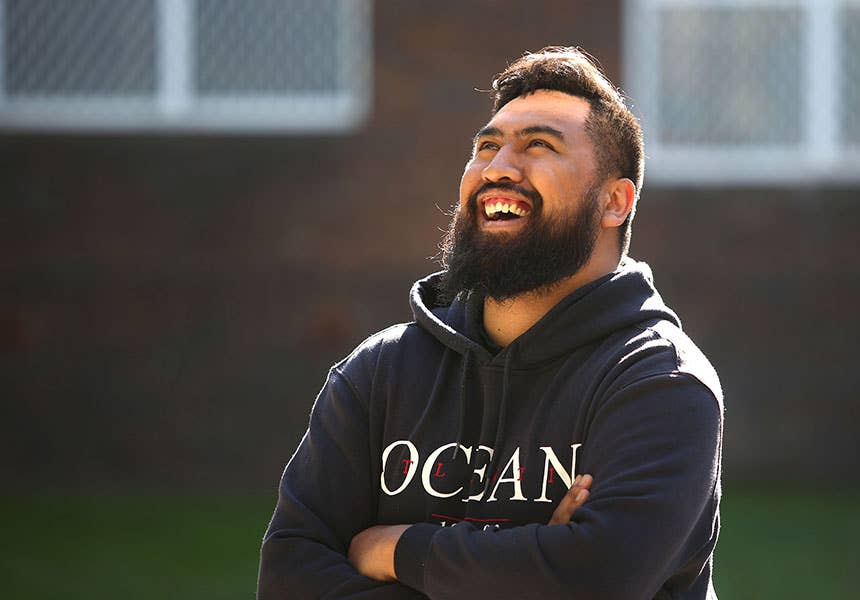Before coming to UTS College, student ambassador Paniora Nukunuku (also known as ‘Pnuks’) was working with a Western Sydney advocacy group for young people. A former client of many of their services, he brought unique insights to the job.
Originally from New Zealand, Paniora’s family came to Australia when he was a small boy, settling in the Canterbury Bankstown area. “Growing up, I’d used services ranging from youth homelessness to mental health issues, to education support, and even just school holiday activities. Eventually I asked them, ‘How do you get into this work’?” he says.
“They explained the process to me – doing Cert III, Cert IV and diploma. Going to TAFE got me started and I soon got to network with a lot of organisations like Father Chris Riley’s Youth off the Streets, Barnardo’s, Mission Australia, Headspace, and local governments around metro Sydney. I loved the work. I wanted to try and give young people opportunities I never had when I was growing up.”
A ‘hazy dream’ becomes a reality
His youth worker friends had also suggested university – something Paniora had never considered. To him, it seemed unattainable. “I thought that was just a hazy dream,” he says. “My family never knew anything about university, let alone me. Then just by fluke, six months later I discovered that I was eligible for HECS. I’d been an Australian citizen for ten years, which means I could have gone to university much earlier. I just didn’t know,” he says.
“Another work friend recommended UTS College. She said she’d had a great experience. So, I looked it up and saw a course that included social media. I’d developed a knack for content creation doing community services and I thought it was a chance to upskill.”

A UTS College Diploma of Communication helped Paniora refine his 'knack' for content creation.
Paniora says he’s always been ‘chronically online.’ “I remember stumbling into a chat room at a young age. I made lasting friends there and started cultivating knowledge around meme culture. I think that’s where I learned to synthesise complex issues into bite-sized, digestible pieces of content,” he says.
Jumping onto TikTok
Of his impressive following on TikTok, Paniora says, “I got very lucky there. It was just at the peak of COVID. Everyone was at home, on their phones, laptops, and devices. With all those eyeballs on screens, I just wanted to make funny videos. A friend of mine’s younger sister was like, ‘If you want to know what young people are doing, you should jump on TikTok. One of my videos had 21 likes on Instagram, so I reuploaded it to TikTok just to see. It got 58,000 likes and 780,000 views in the space of 24 hours. It was crazy.”
He was hooked. “I kept repeating that content, and also put up a lot of social commentary around 2020 and COVID. There was so much content to create with the geopolitics, the pandemic, the bushfires, the transition to working from home, the lockdowns and everything. I think short-form video is the best way to really condense complex information.”
When the offer to become a student ambassador came, Paniora saw it as another way to consolidate his social media skills. He says, “It was a great opportunity to learn about industry standards. I count my lucky stars I was recruited. I’ve learnt a lot about what large companies expect, and what’s best practice. That’s all in addition to what I’ve learnt in my course.”
Smashing out his goals
Having successfully completed a Diploma of Communication at UTS College, Paniora’s now studying for his Bachelor of Communication (Digital and Social Media) at UTS. He credits the College for helping him reach his study goals. “They had small classes, and tailored support, with access to all the facilities at UTS. It was a friendly environment that fostered really good, long-lasting friendships with classmates. These things helped me smash out my goals, not just in getting my diploma, but also gaining skills in networking and opportunities I don’t think I would’ve had otherwise,” he says.

Paniora wants to see more first-generation graduates embrace the challenges and opportunities of UTS and UTS College.
He was also impressed with the Access and Inclusion support available for students who have disabilities. As a person living with a disability, he says, “UTS and UTS College make their accessibility workers very visible, and they’re always accommodating. They’ll provide you with any information you need and can sit with you to go through any documentation. You never leave the meeting unsure about whether everything’s been taken care of. It’s great knowing they’re there for you.”
Doing better for people with disabilities
Paniora’s social media content often explores the way society responds to the needs of people with disabilities. Although he believes Australia does quite well in this regard, he sees potential for improvement. “We’re ahead in many ways, but I think it’s scary that we still have gaps in our regional and rural areas. And there’s a lack of education about what a disability is, and how not all disabilities are visible. I know we can create a society and an environment that does better,” he says.
When asked whether he has any advice for students who are just starting out, Paniora says, “I want to encourage as many people, especially young people, as possible not to give up when it comes to further education. Especially those who are going to be first-generation academics or first-generation graduates. UTS and UTS College will give them the opportunity not just to learn new skills, but to be in spaces that will challenge them and inspire them to do more.”
Find out more about the Diploma of Communication >